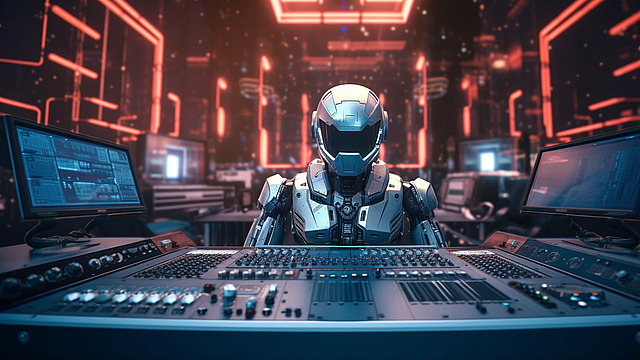
Blog
True love for great sound unites us.
Blog
True love for great sound unites us.

Welcome to a whole new world of music production, where artificial intelligence is not just science fiction but rather a tool that we can use for creating music, enhancing audio, writing lyrics... and much more.
In this blog, we will take a deep dive into AI- and machine learning-powered online tools for audio creation.
Our comprehensive list is divided into five categories:
We're starting off on a high note, namely with music generators. Music generators are software that uses AI and machine learning algorithms to create "original" musical compositions.
Many AI-powered music generators allow their users to customize the generated tune by selecting details such as genre, tempo, mood, instrumentation, length, or even the artist that the song should be based on.
On our list, you will also find some more unique generators that can complete the song you started... Ideal for those who, like some of us, have more than 100 unfinished projects on their hard drive.
If you need lyrics for a song, but you are not a born poet, you may want to try lyric generators.
Lyric generators use AI and natural language processing algorithms to generate song lyrics.
They work similarly to music generators - they analyze huge amounts of already existing song lyrics and use this data to create new ones. Some of the generators allow you to enter keywords or phrases to be included in the lyrics or to specify the genre, mood, or an artist you’re attempting to rip off.
By now, you have a backing track & lyrics, but what if you can’t sing either?
AI voice generators are programs that use AI and machine learning algorithms to synthesize human-like speech.
These tools analyze large amounts of voice data, including speech patterns, intonation and vocal characteristics, and use this information to create new voice recordings. AI voice generators can be used to create synthetic voices for a variety of purposes, not just music - virtual assistants, audiobooks and voice-over for commercials or movies.
If sound quality is an issue in your recordings, then audio enhancers may prove to be a game-changer for you.
Audio enhancers improve sound quality by automatically removing noise, echo, enhancing speech or music, and adjusting the volume or audio pitch.
They are suitable not only for improving music recordings but, in fact, any audio recording - for example, fixing degraded sound in an old movie from a VHS cassette or removing room noise in a podcast recorded at home.
Many of the enhancers on our list allow the user to control various parameters such as reduction level, EQ, volume, etc.
AI mastering services are online tools that use AI and machine learning algorithms to improve the sound quality of audio recordings automatically.
AI mastering services use complex algorithms to analyze the input audio and make a series of adjustments to the overall volume, EQ balance, and stereo image.
Especially if you're a beginner, the result is a final mix that might sound more refined and balanced, with higher overall quality than the original recording.
As much as it’s tempting to use AI tools to make your music creation process smoother, don’t fall into the trap of becoming lazy.
It’s fine to use AI as a source of inspiration. But if you don’t want your music to lose the “human touch”, you, as a human, will have to do 99% of the work. AI can create music that sounds pleasant, but it will lack originality because it’s always (ALWAYS) based on something that already exists.
And this brings us to the next point - AI is only as good as the data it’s trained on. While it can analyze a lot of existing songs, texts, etc., it may not have the same kind of holistic knowledge that a human musician or lyricist does. And that, in turn, limits the depth and nuance of the music it will generate.
Most importantly, don't forget that music-making is supposed to be a fun experience, not a chore that you would rather outsource to your robo-nanny.